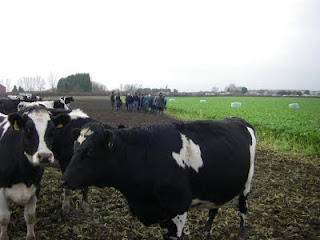Farming for the Future….Do we support Innovation by Leading Farmers.
Craige
& Roz MacKenzie, are the Canterbury Farm Environment Award winners 2013. Very deserving winners....Congratulations.
The MacKenzie family (including daughter Jemma) are one of the most innovative,
creative, Push-The-Boundaries, Farm & Research businesses I’ve ever seen.
Andy
MacFarlane (MacFarlane Rural Business) last week chaired a very successful
Ballance Farm Environment Award fieldday at Greenvale Pastures farm near
Methven in Canterbury, New Zealand.
Greenvale Pastures Ltd Mission
Statement – “Farming for the Future” That was our mission statement when we started out in 1994 and
continues
today. Our aim is to be the best at what we do, maximizing
production and profitability while ensuring that the systems and
resources we use show an excellence in total farming practice
and that the methods we use have good scientific backing and are
sustainable for our family, farm and the environment.
We believe that:
• The environment in which we live is our legacy
• water is a valuable multi-use resource
• attention to detail is what gives us an edge
• understanding of costs is essential
• knowledge is the key.
The NZ Ballance Farm Environment Award regional competition
rewards farming families who are working hard to minimise the environmental
footprint of their farm. This is to be applauded as it identifies some
imaginative & innovative farmers who
in their own right are very effective researchers and implementers of world
best practice for the environment. Last week we saw some very advanced smart
technology being used to reduce water use, mimimise fertilizer and maximise
production for a range to crops & dairy.
I was excited, I could see a future through Craige & Roz’s
vision and I can imagine the likely impact both in Canterbury and across New
Zealand.
However on the flight home
I felt slightly gutted and left wondering about innovation in NZ and NZ innovators.
Are we in New Zealand fully supporting these leading farmers who are at the
forefront of Agricultural Science innovation? The research that the entrepreneurial
MacKenzie family are energetically leading could not realistically be completed
by a NZ institutional research facility.
Where are the R & D tax incentives for farms like Greenvale Pastures???
Where are the R & D tax incentives for farms like Greenvale Pastures???
New Zealand has been constructively criticized
by Shaun Hendy and Paul Callaghan (in their book “Get off the Grass”) regarding
the lack of innovation or support for innovation.
“The country’s lack-lustre economic performance
following the free-market reforms of the 1980s is often cast as a paradox: why
haven’t sound economic policies led to growth? Shaun Hendy and Paul Callaghan argue that the New
Zealand ‘paradox’ can be explained by our struggle to innovate. On a per capita
basis, OECD countries on average produce four times as many patents as New
Zealand. Why is this? What determines a country’s capacity for innovation?” Read about it
New Zealand struggles to innovate.
In addition to the 200ha Arable farm there is an interest in a
1200 cow 326ha dairy farm.
Some of the smart technology we were privileged to see included :- Profit mapping, Electromagnetic EM Variability(soil moisture management), Variable Rate Base Fertilizer, Lysimeter Project, Pasture Mapping with “GreenSeeker” technology, Variable Rate Nitrogen, Variable Rate Irrigation and the BioBed-managing sprayer cleanout waste.
Some of the smart technology we were privileged to see included :- Profit mapping, Electromagnetic EM Variability(soil moisture management), Variable Rate Base Fertilizer, Lysimeter Project, Pasture Mapping with “GreenSeeker” technology, Variable Rate Nitrogen, Variable Rate Irrigation and the BioBed-managing sprayer cleanout waste.
The list of smart technology on this farm is very long.
BioBed-managing sprayer cleanout waste
Let’s not forget the environmental concerns like pollination
& the Honeybee…..responsible for approx.
$50million in honey exports but a $3 Billion contribution to all of NZ food
production.
On the dairy farm Variable Rate Irrigation was saving up to 30%
of water used. Sure there is a need to invest in capital smart technology but
really it’s a “#No-Brainer” if there are different soil types on the farm.
Pasture Mapping w/ GreenSeeker®
Mapping biomass variability
Identify high nitrogen areas
Reduce or eliminate nitrogen application from high N unproductive
areas
Keep records of pasture
production
5
Average rate/ha decreased
to 49kg/ha with use of GreenSeeker
& VR application
Savings = 21 kg/ha of Urea = $19/ha
Much of the commercial technology is managed through the family
business. Agrioptics
Learn about this technology
Craige also plays a leading role in Precision Agriculture in NZ.
This was one of the best days I’ve had in New Zealand….what is
slightly amusing in that I was completely out of my depth most of the day but
loving the discussion!
Thinking as I
reflect that most institutional research farms could not compete and may no longer
be fit for purpose. Yet they have better access to funding.
Quite unsettling is a conviction that leading innovative
farmers don’t get the support they should in NZ.If we in agriculture, are to positively impact the environment this surely must change!
















